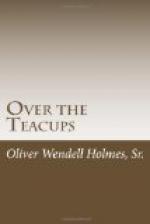Conticuere omnes, as Virgil says. We were all silent as Number Seven began the reading of his paper.
Number Seven reads.
I am the seventh son of a seventh son, as I suppose you all know. It is commonly believed that some extraordinary gifts belong to the fortunate individuals born under these exceptional conditions. However this may be, a peculiar virtue was supposed to dwell in me from my earliest years. My touch was believed to have the influence formerly attributed to that of the kings and queens of England. You may remember that the great Dr. Samuel Johnson, when a child, was carried to be touched by her Majesty Queen Anne for the “king’s evil,” as scrofula used to be called. Our honored friend The Dictator will tell you that the brother of one of his Andover schoolmates was taken to one of these gifted persons, who touched him, and hung a small bright silver coin, either a “fourpence ha’penny” or a “ninepence,” about his neck, which, strange to say, after being worn a certain time, became tarnished, and finally black,—a proof of the poisonous matters which had become eliminated from the system and gathered upon the coin. I remember that at one time I used to carry fourpence ha’pennies with holes bored through them, which I furnished to children or to their mothers, under pledges of secrecy,—receiving a piece of silver of larger dimensions in exchange. I never felt quite sure about any extraordinary endowment being a part of my inheritance in virtue of my special conditions of birth. A phrenologist, who examined my head when I was a boy, said the two sides were unlike. My hatter’s measurement told me the same thing; but in looking over more than a bushel of the small cardboard hat-patterns which give the exact shape of the head, I have found this is not uncommon. The phrenologist made all sorts of predictions of what I should be and do, which proved about as near the truth as those recorded in Miss Edith Thomas’s charming little poem, “Augury,” which some of us were reading the other day.
I have never been through college, but I had a relative who was famous as a teacher of rhetoric in one of our universities, and especially for taking the nonsense out of sophomorical young fellows who could not say anything without rigging it up in showy and sounding phrases. I think I learned from him to express myself in good old-fashioned English, and without making as much fuss about it as our Fourth of July orators and political haranguers were in the habit of making.
I read a good many stories during my boyhood, one of which left a lasting impression upon me, and which I have always commended to young people. It is too late, generally, to try to teach old people, yet one may profit by it at any period of life before the sight has become too dim to be of any use. The story I refer to is in “Evenings at Home,” and is called “Eyes and No Eyes.” I ought to have it by me, but it is constantly happening that the best old things get overlaid by the newest trash; and though I have never seen anything of the kind half so good, my table and shelves are cracking with the weight of involuntary accessions to my library.




